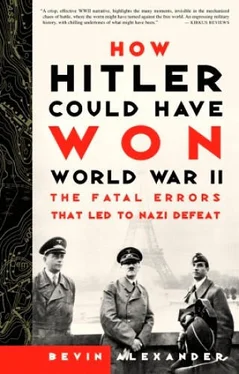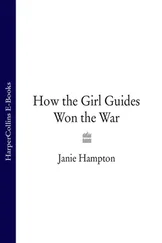Bock agreed with Guderian, but, like Brauchitsch and Halder, did not have the stomach to challenge Hitler. He and army headquarters (OKH) were willing to let the impetuous Guderian challenge Hitler alone and tacitly went along with a delaying operation Guderian set in motion to frustrate Hitler’s orders.
The effort hinged on seizing the town of Roslavl, seventy miles southeast of Smolensk, at the junction of roads to Moscow, Kiev, and Leningrad. Roslavl was important as a jumping-off point for Moscow. But Guderian’s principal aim was to entangle his forces so deeply in this operation that orders to assist Rundstedt would be canceled and he could resume his drive to Moscow.
The Russians inadvertently took part in the conspiracy. Stalin rushed reserves to Roslavl—raw units in training and militia outfits called into service, Stalin’s only source of fresh troops. Hitler postponed the diversion of Hoth and Guderian on July 30 and agreed to visit Army Group Center on August 4 to see the situation for himself.
At this conference, Bock, Hoth, and Guderian separately told Hitler that continuing the offensive against Moscow was vital. Hitler then assembled the officers and demonstrated how little he could be moved by logic and military considerations. He announced that Leningrad was his primary objective, and he was inclined to select the Ukraine next because its raw materials and food were needed, Rundstedt seemed on the verge of victory, and the Crimea had to be occupied to prevent Russian planes there bombing the Ploesti oil fields.
“While flying back,” Guderian wrote, “I decided in any case to make the necessary preparations for an attack toward Moscow.”
He planned to concentrate his panzers on the Roslavl-Moscow highway, roll up the Russians along that road through Spas Demensk to Vyazma, about 90 miles east of Smolensk, and thereby ease the path of Hoth’s panzers also heading toward Moscow on the north.
Meanwhile, on August 7, Jodl and Halder persuaded Hitler to renew the advance on Moscow. Three days later resistance at Leningrad caused him to change his mind again and order Hoth’s tanks to help Leeb. Hitler now saw that OKW, Bock, and Guderian were prevaricating, lost his patience, reinstated the order that Guderian assist Rundstedt, and sent a wounding letter to Brauchitsch accusing him of a lack of “the necessary grip.” Brauchitsch suffered a mild heart attack. Halder urged him to resign, and did so himself, but Hitler refused it.
Everything came to a head on August 22, when Guderian got an alert to move his group south to help destroy Russian armies around Kiev. The next day at a commanders’ conference at army group headquarters Halder announced that Hitler now had decided that neither the Leningrad nor Moscow operations would be carried out, and efforts were to be focused on capturing Ukraine and Crimea.
Everyone present knew this meant a winter campaign, for which the German army was not prepared, and the conflict would turn into a war of attrition.
Bock and Halder arranged a personal interview of Guderian with Hitler to try to get him to change his mind. Guderian flew back to Rastenburg with Halder. Hitler heard him out, but then launched into a verbal offensive.
His commanders “know nothing about the economic aspects of war,” he said. He insisted that the economic zone from Kiev to Kharkov had to be seized, and the Crimea captured to prevent Soviet aircraft bombing Ploesti. Since the other officers in Hitler’s circle were in full support or were afraid to oppose him, Guderian realized it was pointless to argue.
Hitler’s irresolution had consumed a month of dry summer when his panzers could have rolled to Moscow. Now he delayed even longer in order to seize Ukraine. On August 25 Guderian turned south on the new mission that would take another month to finish. By the time he could get back on the Moscow road the autumn rainy season would arrive, a period of mud called Rasputitsa (literally “time without roads”), which would slow or stop vehicles and the advance. After that would come the Russian winter.
The disputes in July and August demonstrated that Adolf Hitler did not possess a fundamental prerequisite of great commanders. Successful generals from Alexander the Great on have thought out their objectives in advance and adhered doggedly to them in the stress and chaos of battle, ignoring peripheral targets, however attractive, and passing up partial victories in order to achieve total success at the end.
Hitler could conceive of no great strategic plan. And once embroiled in a campaign, he was ready to toss aside even his general goal to seize an opportunity that appeared. He had shown this irresolution in a negative way in the 1940 campaign, wanting to halt the panzers out of fear just as they were about to break out into undefended space, and actually stopping the tanks before Dunkirk.
The attack on Kiev is one of the greatest examples in history of how a leader can be seduced by the vision of a short-term gain into abandoning a course of action that would have given him victory. At Kiev Germany won a great local victory, but surrendered its last chance to win the war.
Kiev did offer a tempting target. Army Group South had not taken Kiev, but had seized Dnepropetrovsk on the bend of the Dnieper River, 250 miles southeast of Kiev. Stalin had ordered the defense of the Kiev region at all costs, and Soviet supreme headquarters (Stavka) sent three additional armies to reinforce the Southwestern Front under General Mikhail Kirponos and Marshal Seymon Budenny.
The situation was now set for a giant envelopment, for Guderian’s Panzer Army at Starodub was far to the east and north of Kiev. If Kleist’s Panzer Group 1 at the Dnieper bend advanced north, while Guderian drove south, they could close off the region around Kiev. This was the opportunity that Hitler had seen, and this prospect is what drew him away from the attack on Moscow.
The campaign got under way on August 25. While 2nd Army pressed south from Gomel, Guderian’s panzers struck from Starodub, seventy-five miles to the east, and seized a bridge over the Desna River, sixty miles south, before the Russians could destroy it. Heavy Soviet resistance required a week of bitter fighting for Guderian to break out and continue south.
Meanwhile Kleist’s Panzer Group 1 moved from Dnepropetrovsk to the more westerly crossing of the Dnieper at Kremenchug, and launched his arm of the pincers on September 12.
By this time, the Soviets were beginning to realize their danger, but could do little to stop Guderian. Budenny sent a general to Moscow asking permission to retreat. But Stalin replied: “Hold at any price.” He also replaced Budenny with Semen Timoshenko as Southwestern Front commander. The Soviet army group was left in a hopeless position. On September 14–15 the points of the German armored columns met at Lokhvitsa, 125 miles east of Kiev. The caldron was closed.
When Timoshenko arrived, he recognized the incredible danger, and on September 16 ordered withdrawal on his own, despite the example of Western Front commander Dimitri G. Pavlov, whom Stalin had ordered shot on July 1 over the disaster at Minsk. Kirponos dared not carry out the order, however, and wasted two days in a futile effort to get permission from Stalin. By then it was too late. The Germans had formed an iron ring around the caldron and tore the Russian armies apart as they tried to break out. Kirponos died in the fighting. By September 19, when the Germans seized the city of Kiev itself, Russian resistance had virtually ended.
The Germans captured 665,000 men in the Kiev caldron, the largest single military success in history and the largest haul of prisoners ever attained in one battle.
10 FAILURE BEFORE MOSCOW

Читать дальше



![Джонатан Димблби - Barbarossa - How Hitler Lost the War [calibre]](/books/385421/dzhonatan-dimblbi-barbarossa-how-hitler-lost-the-w-thumb.webp)









